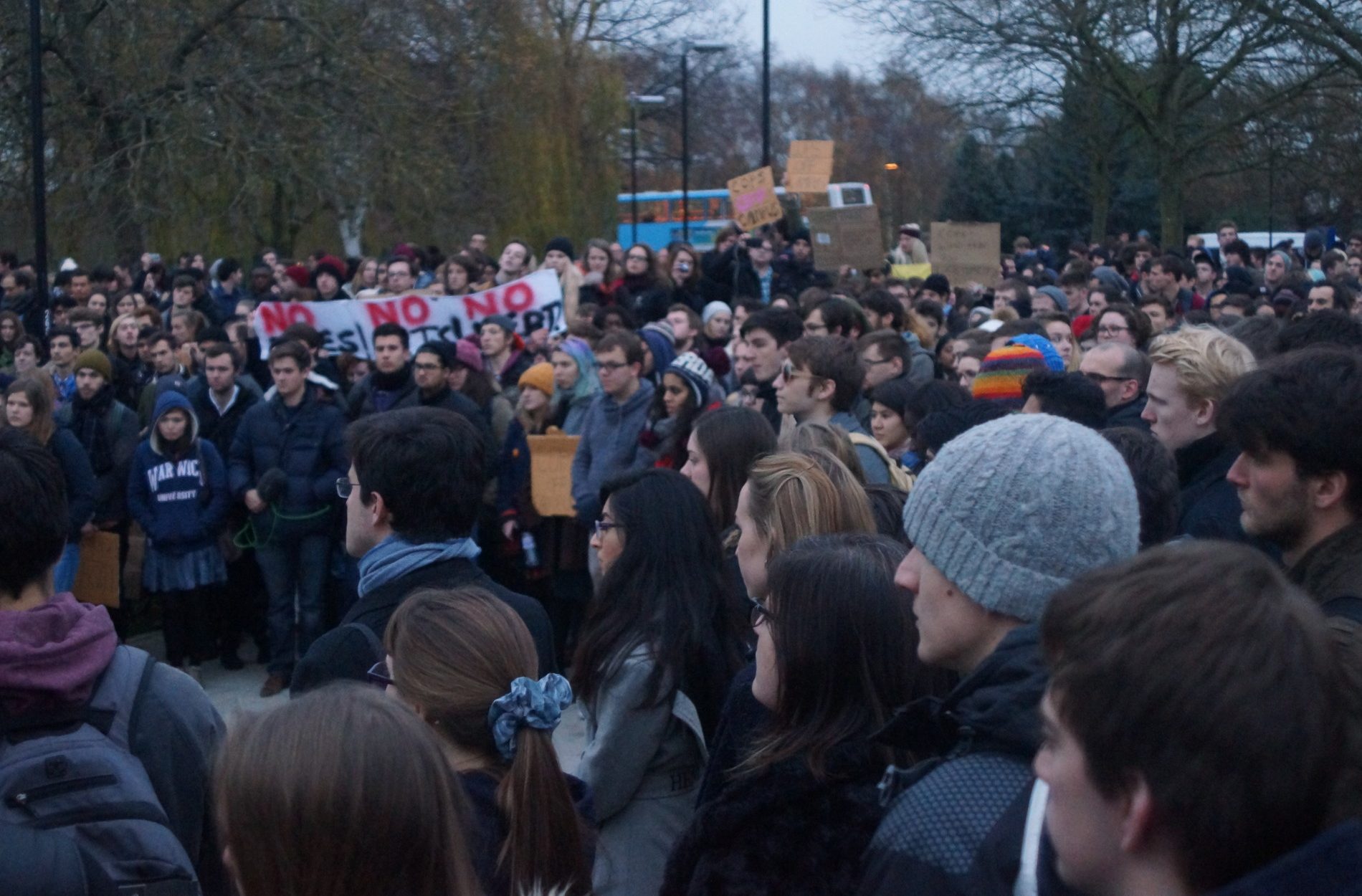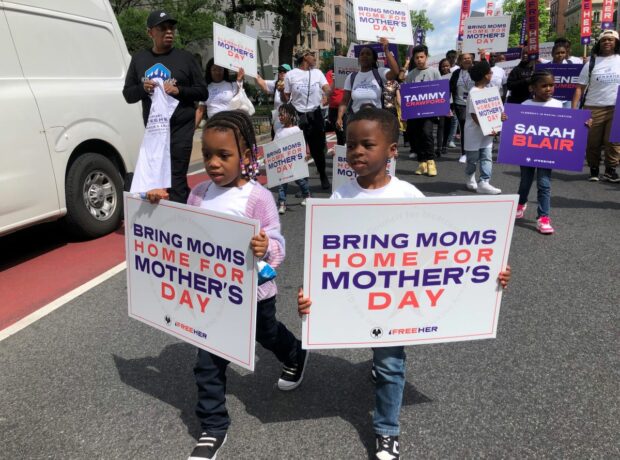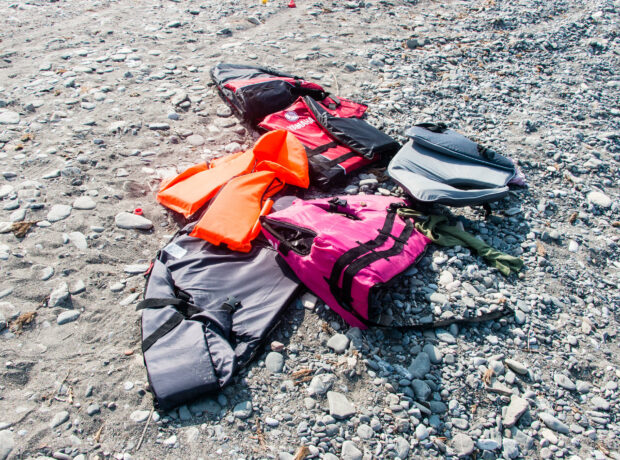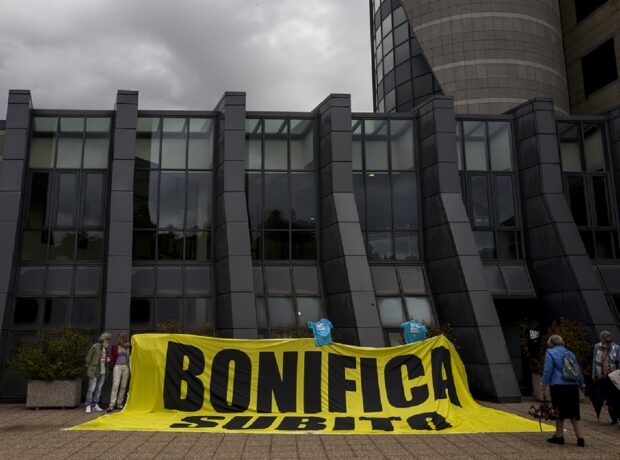James Harrison and Lewis Smith are both editors of Lacuna Magazine and members of the Centre for Human Rights in Practice at the University of Warwick. In March 2016, they organised a week of events at their university on the theme of protest. Here they reflect on how the week made them feel – worried about multiple threats to free speech and protest on university campuses, but also exhilarated by the creativity and imagination of some of the campaigns they encountered, from cross-dressing protestors in tanks to new unions fostered in Paris.
For a long time, universities have enjoyed a long and complex relationship with protest. The University of Warwick is no different, and a new chapter was written into the history of this relationship in December 2014, when police were called onto campus to deal with allegations of an assault. After arriving in riot vans, officers used CS gas and a taser in their altercations with protestors. Video footage taken on a mobile phone captured the incident – screams, streaming eyes and all – and the story quickly became national news.
In the aftermath of this episode, our Human Rights Centre decided to convene a ‘protest summit’ to bring together (among others) the university’s Vice-Chancellor, the Chief Superintendent of the local police force and representatives of the student body, in an attempt to address some of the concerns raised. We also sought the views of the rest of the campus community: prior to the summit, we organised an online survey, open to all staff and students at Warwick. We asked people what concerns they had about protest on campus, what questions they wanted answered, and what they wanted done differently in the future.
In some ways, the survey was more enlightening than the summit itself. There were 579 responses. Many respondents were concerned about the behaviour of police, university management and (to a lesser extent), the protestors themselves on 3 December. But beneath the immediate reaction to the events on that day, deeper questions were also being asked from many quarters. Perhaps most strikingly, many respondents were concerned about threats to our willingness and ability, as a university community, to speak our minds and to discuss issues of fundamental importance.
Protest and Performance Week
One year on from the protest summit, in the Spring of 2016, we organised a week of events – ‘Protest and Performance Week’ – to prompt people to think again about issues of protest and free speech.
This time we wanted to engage with the theme of protest in a slightly more creative, energised and inspiring way. We also wanted to offer a platform to discuss some of the broader questions that the survey responses had raised.
So during the week we arranged for stand-up comedy, film, theatre and photographic art, alongside panel discussions on a number of protest-related themes. We asked broader questions of protest itself: what makes protest, in all of its forms, enticing, legitimate, rewarding, fruitful…? What are the wrongs that provoke our anger and how do we take action in response? What role does protest play in bringing communities of actors together on a local, national or international level?
We also wanted to delve deeper into the relationship between protest, students and the university space. We wanted to explore how our rich and complex history of student and staff activism has manifested itself, how students engage with protest, where the borders of ‘appropriate action’ lie, and whether it is even possible to define such borders at all.
Over the course of the week, we heard from students and academic staff from across a range of disciplines, and from support staff as well. One of the most striking things to emerge from these discussions was a general consensus that our university environment is changing more rapidly than ever before. We found that our speakers and audiences are worried about the changes that are taking place, and the threat they pose to the possibilities for protest and free speech on campuses – not only at Warwick but across the UK and beyond.
People are worried about working in a university environment where government anti-terrorism policy seeks to limit who speaks and what they can say on the university campus. How do we ensure that this does not “have a chilling effect on open debate, free speech and political debate”?
People are worried about working in a university environment where the legal right of students to demand information from their institution is under threat, but the legal right of the university to eject protesting students from university buildings looks increasingly permanent. How do we ensure that these legal protections are appropriately balanced to allow challenging conversations to flourish between all parts of the university community?
People are worried about working in a university environment where crude measures of student satisfaction may become increasingly the determinant of whether our teaching is ‘successful’. When satisfaction may best be achieved by giving students exactly what they want, how will we continue to ensure that we are engaging our students in challenging ideas and difficult debates?
People are worried about working in a university where abolishment of support to the poorest students may lead to less of those students being part of the university community. How do we ensure that the voices who participate in university life do not narrow so that we look increasingly unrepresentative of the society which we are seeking to understand and explore?
People are worried about working in a university environment where we may no longer be allowed to take the ideas from our studies, reach outwards and inform important policy debates. How do we ensure that we can continue to enter into, and have an influence upon important debates beyond academia?
And people also expressed concerns about working in a university environment where student politics in relation to ‘safe spaces’ and ‘no platforming’ of speakers is on the increase. Particularly in an environment where universities may be more inclined to give students what they want, how do we ensure that this does not lead to the undermining of the basic principle of democratic political exchange on the university campus?
Reasons to be Cheerful?
At the same time, the discussions during the week also revealed (and inspired!) a sense of hope and optimism. Throughout the week, we learnt of protesters and protest movements from across the world who are working creatively and imaginatively to make their voices heard.
Adam Weymouth and Nathaniel Shiers both talked about their experiences of being among the protestors at the UN climate change conference in Paris; how different it was from the environment at the previous conference at Copenhagen, and how the alliances forged by the activists give them hope for what those activists might achieve in the future.
Emily Scurrah from 38 Degrees talked about the creative power of protests and shared stories of playful, subversive campaigns: The space Hijackers who drove a tank into an arms fair. The UK Uncut group who presented the head of HMRC with a special thanks from Vodafone for aiding them in their tax evasion; the Sisters Uncut’s ‘die-in’ on the red carpet at the premiere of the film Suffragette.
Keira Koroma talked about the terrible treatment of women in Yarl’s Wood Detention Centre, but also her experiences of joining the protestors outside the Centre and the sense of strength, determination and unity which they managed to create with the protestors inside.
We also heard from individuals who have used their artistic talents to provoke new insights about protest. We heard from Amir Amirani, director of We Are Many, a critically acclaimed film about the Iraq War Protests – the biggest ever global protest in the history of mankind. For Amir, “the very act of coming out onto the street and finding out that you are not alone, and that other people share you views is transformative in itself.” While the Iraq protests themselves did not have an immediate effect in stopping the War, he argues that the reverberations of that mass protest movement can still be felt today.
Stand-up comedian Kate Smurthwaite talked about her experiences of being deemed “too controversial” to be allowed to speak at Goldsmith’s College, and how the very limited democracy we enjoy means that it is vital we safeguard our right to free speech and to use direct action to protest in situations where government is taking action that is morally unpalatable.
And our own Warwick students made liberal use of eggs, toilet role and optimism to explore the university as a space for protest in an immensely enjoyable theatre production. Who says protest can’t be fun?
Looking Forwards
The intention of Protest and Performance Week was never to find definitive answers or a one-size-fits-all model for protest in the 21st century.
Instead, we wanted to ask questions, share concerns, cast new light on well-worn subjects, offer a platform for voices that would otherwise be unheard, and bring together audiences that are too often divided by discipline or role. It is inspiring to see that these conversations continue to take place: Adam, Emily and Keira have all written pieces for Lacuna that elaborate on the ideas discussed during the week, and the magazine continues to publish all kinds of innovative thoughts, ideas and experiences of protest. We hope you will be inspired to join the conversation.
The films featured in this article were created by Christopher Sanders and Joe Horsey.
Christopher Sanders is a freelance writer and filmmaker from London. He is currently studying for an MA in English Literature at the University of Warwick. His main interests are the films of Paul Thomas Anderson and the literature of J.D. Salinger.
Joe Horsey is a freelance filmmaker from Sheffield. He is currently studying for an MA in Film Studies at the University of Warwick. Joe’s main passions in life are for documentary film – production and studying – and writing and playing music.
Banner photo by Ann Yip.



